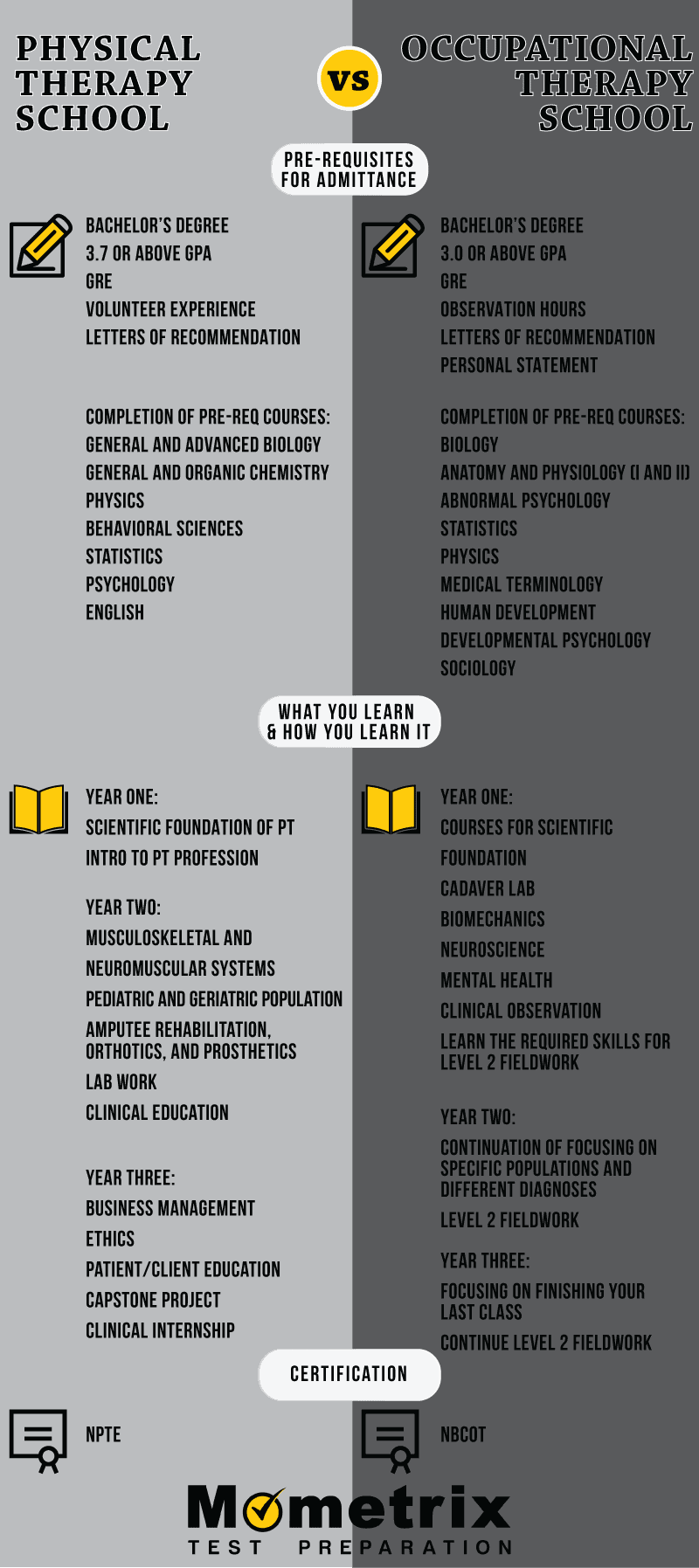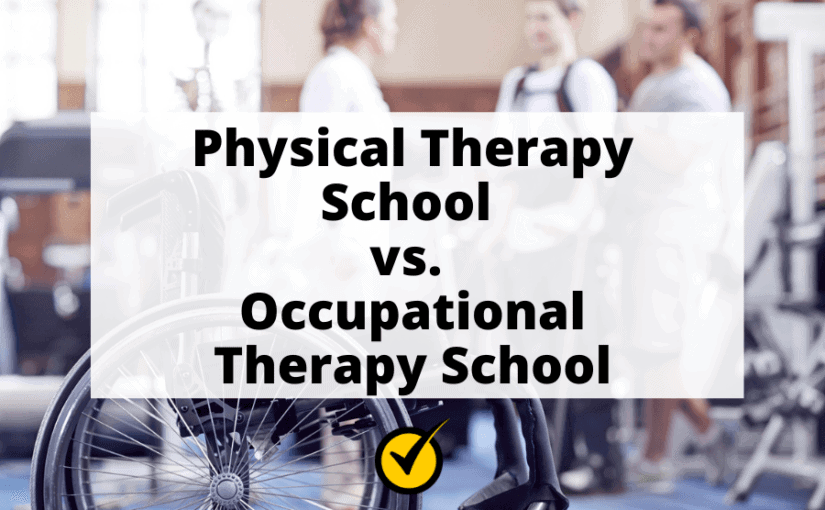When you begin to choose a career path, you’ll have a lot of questions and there’s a lot of decisions you’ll need to make.
Many people choose to have a career in therapy; either physical therapy or occupational therapy. If you’re considering a career in therapy, you may be wondering what the difference is in schooling.
Physical Therapy vs. Occupational Therapy
Physical therapy and occupational therapy have a lot of similarities. When someone is injured, both types of therapists help people regain, maintain or even relearn the strength and skills they need to be active and participate in everyday life.
However, it can be difficult to decide which therapy route to go into.
Physical therapists, or PTs, are described as “movement experts” because they focus on the movement of the body through hands-on care. They’re trained extensively in body mechanics and use treatment techniques that are designed to reduce pain, restore function, and prevent disability.
Physical therapists devise personalized treatment plans for people who are recovering from an injury such as from sports or other accidents. They also work with individuals who may have lost mobility from a stroke.
Physical therapists work with people of all ages or can specialize in a certain age group such as young athletes who have sports injuries.
Physical therapy also involves focusing on and teaching how to prevent injuries. A PT’s main goal is to get their patients back into motion with exercises, massage, and other techniques.
Occupational therapists use therapeutic techniques to help maintain the patient’s ability to perform everyday tasks and activities such as dressing and bathing.
Occupational therapists have a wide range of duties and tasks when it comes to patient care such as being responsible for patients to develop, recover, and improve a condition or injury. Their goal is to get their patient to their highest degree of independence possible.

Physical Therapy School vs. Occupational Therapy School
Even though both careers focus on therapy and there are a lot of similarities, there are also a lot of differences when it comes to schooling.
Acceptance
Both physical therapy school and occupational therapy school require that you have a bachelor’s degree. You’ll need to have completed basic prerequisites before you can apply for physical therapy school.
These prerequisites are usually required before admittance into the doctor of physical therapy program.
- General and advanced biology
- General and organic chemistry
- Physics
- Behavioral sciences
- Statistics
- Psychology
- English
Many programs also require their students to have completed courses in neuroscience, anatomy, or integrated physiology.
GPA
Your GPA is important when you’re applying for physical therapy programs. Many schools require that your GPA is 3.57 or above. Most schools have their own minimum GPA requirements, so it’s important that you get that information from the school you plan to apply to.
GRE
Taking the GRE (Graduate Record Examination) is required for most PT programs. Like your GPA, you’ll need to contact the school of your choice to see what the minimum score is for the GRE for admittance.
Experience
Getting experience is important as well. Many PT programs require their applicants to have either volunteer or paid experience working with patients under the supervision of a licensed physical therapist. Applicants may be required to have a licensed physical therapist verify the hours they volunteered or worked.
Letters of Evaluation/Recommendations
Many PT programs require one to four letters of reference which are known as letters of evaluation. Applicants are allowed to submit references from a physical therapist, professor, or academic advisor.
Complete the Interview
Many PT programs require you to complete an admissions interview. If you’re selected for an interview, you’ll be required to discuss why you have chosen to pursue a career in physical therapy and how to see the role of PTs in the healthcare field. During your interview, you may be rated on your professional behavior and attitude, oral communication skills, ability to interact in a group, knowledge of the profession, and the ability to solve problems.
Occupational Therapy School
To be able to be admitted into occupational therapy school, you’ll need a bachelor’s degree before you can get your master’s or doctorate degree. Before you finish your bachelor’s degree, you’ll need to make sure that you complete the prerequisites that are required for most OT programs.
The majority of OT programs usually require these prerequisites:
- Biology
- Anatomy and Physiology (I and II)
- Abnormal Psychology
- Statistics
- Physics
- Medical Terminology
- Human Development/Developmental Psychology
- Sociology
GPA
As with PT programs, your GPA is important when you’re applying for OT programs. It’s recommended to have a GPA as high as you can, but you should have at least a 3.0.
GRE
Many occupational therapy schools require their applicants to take the GRE and have a specific minimum score. However, these GRE scores vary depending on the school you apply to. It’s important to find out what GRE score your school of choice requires.
Observation Hours
Most OT programs require their applicants to have 30 occupational therapy observation hours, also known as shadowing. Not only is shadowing required, but it’s also a great idea so that you can get a thorough idea of the occupational therapy field.
Letters of Recommendation
Every OT program requires letters of recommendation, one being from an occupational therapist. You will need to have other letters from a professor and a supervisor.
Personal Statement
Your personal statement explains to the admittance committee why you want to pursue a career as an occupational therapist and why you’re truly passionate about becoming one. Some OT programs don’t require in-person interviews, so treat your personal statement as if it is your interview.
What You Learn and How You Learn It
Physical Therapy School
To become a physical therapist, you’ll need to complete your doctorate degree.
Year One
Your first year of physical therapy school will be learning about the scientific foundation of physical therapy. You’ll also have an introduction to the physical therapy profession.
Year Two
In your second year, your coursework will focus more on musculoskeletal and neuromuscular systems. You’ll learn about the pediatric and geriatric population as well as about amputee rehabilitation, orthotics, and prosthetics. You’ll also start lab work and clinical education.
Year Three
In your third year, which is also your final year, you’ll spend time learning about business management, ethics, and patient/client education. On top of this, you’ll complete a capstone project as well as a clinical internship.
Occupational Therapy School
A master’s degree is the minimum standard for becoming an occupational therapist.
Year One
Your first year of occupational therapy school is used to completing the required courses and focusing on establishing a strong scientific foundation. This can include a review of the human anatomy with a cadaver lab, biomechanics, and neuroscience. You’ll also learn about different OT theories and frames of reference. In some OT programs, you may be required to complete group projects. You are also exposed to clinical observation. In many programs, you will be required to complete your Level 1 fieldwork which consists of a 40-hour experience to learn more about being an OT and to help students become comfortable with different populations and develop a professional demeanor.
For some students, OT program courses continued through the summer when you’ll take specific courses such as mental health. You may even start learning the required skills for Level 2 fieldwork such as taking blood pressure and documentation.
Year Two
Your second year of the OT program is a continuation of focusing on specific populations and different diagnoses as well as continuing to learn the basic skills needed for Level 2 fieldwork. You’ll take additional courses such as assistive technology, physical rehabilitation, and pediatrics.
In the second half of your second year, you may begin your Level 2 fieldwork. This is where you will be able to apply the skills you have learned and have hands-on patient contact.
Year Three
Your third year of OT school will be focusing on finishing your last class as well as finishing your second Level 2 fieldwork.
Certification
Physical Therapist
Once you have completed your Doctor of Physical Therapy degree, you’ll need to become certified as a physical therapist in your state. This means that you are required to take and pass the National Physical Therapy Examination (NPTE).
However, to be able to sit for the NPTE, you’ll need to first be approved by both the state you’re taking the exam in and the Federation of State Boards of Physical Therapy (FSBPT).
To be approved for the NPTE, you need to meet one of the following requirements:
- Register online and pay the registration fee ($485)
- Have a CAPTE accredited DPT degree or foreign equivalent
- Comply with test security requests
- Be approved by your state (requirements by state will vary).
Occupational Therapist
A master’s degree is the minimum standard for becoming an occupational therapist and in most states, obtaining your certification is voluntary, but it shows how serious you are about being an OT. To become certified, you must pass the National Board for Certification of Occupational Therapists (NBCOT) exam.
To be eligible for the NBCOT exam, you need to have graduated with an entry-level occupational therapy degree from an accredited program.

